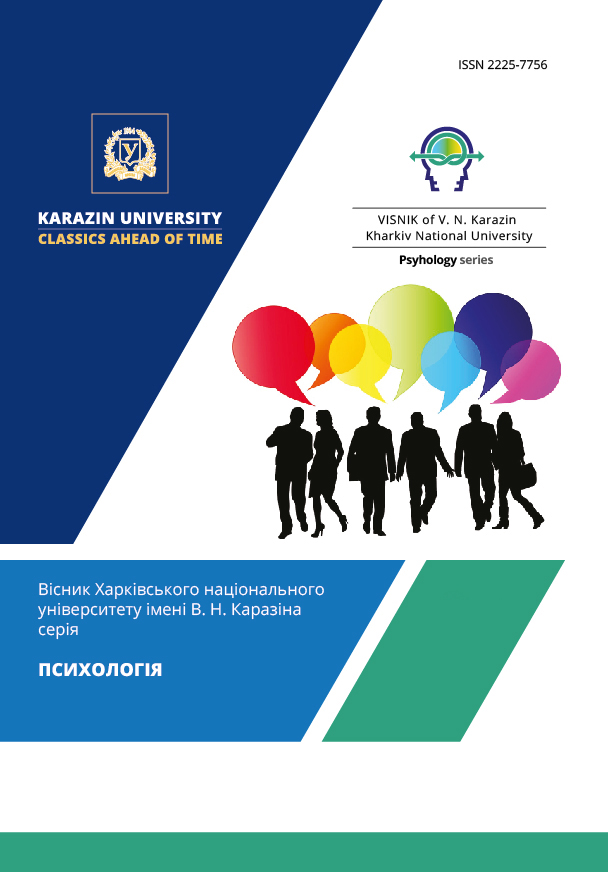Typological Features of the Personal Identity of Women Convicted to Deprivation of Freedom
Abstract
The article analyzes the work of scientists who considered identity as a psychological and social phenomenon. The concept of identity as a complex integrated socio-psychological formation and as a category of adaptive resources of the individual is considered. The problem of formation of personal identity and its influence on socialization and formation of human personality is covered. The insufficiency of theoretical substantiations of studying the peculiarities of personal identity as a structural component of the personality of women sentenced to imprisonment is shown. Personal identity is considered as an important resource for resocialization of convicts. It is noted what changes the personal identity undergoes during the sentence, which is associated with changes in social roles and self-esteem, social stigma, disruption of family ties, difficulties in restoring social functioning (job search, housing, etc.). The importance of the problem of resocialization of convicts, which is due to the need to ensure an individual approach to convicts and persons released from prisons, preventing their return to a criminal lifestyle, the formation of socially favorable forms of behavior after release. The process of resocialization is considered as a complex problem determined by the social environment in which the punishment takes place, the specifics of interpersonal interactions in this environment, the psychological characteristics of the personality of convicts. The study empirically identified the typology of personal identity of women sentenced to imprisonment at the stage of their resocialization, which includes four types of women sentenced to imprisonment: passive-depressed, sociable, self-confident, infantile. The given meaningful description of the types of personal identity of women sentenced to imprisonment can be used to develop measures for their psychological support and correction.
Downloads
References
Andreeva, G.M. (2011). On the issue of identity crisis in the context of social transformations. Psychological research: electron. scientific. zhurn. N 6. URL: http://psystudy.ru (10.10.2012). [in Russian].
Chernysheva, A.V. (2015). The relationship between social identity and socio-psychological adaptation in addictive behavior in women. (Master's thesis). Yaroslavskyi hosudarstvennii unyversytet, Yaroslavl. http://www.rd.uniyar.ac.ru/upload/iblock/08b/avtoreferat-chernyshevoy-a-nov.pdf [in Russian].
Gerasimenko, O.A. (2020). Identity as a category of adaptive resource for women sentenced to imprisonment. Colloquium-journal. V. 12(64). https://doi.org/10.24411/2520-6990-2020-11816 [in Russian].
Grachuk, N.V. (2009). Resocialization of juvenile offenders in the colony: a gender approach. Visnyk Zaporizkoho natsionalnoho universytetu. V 2. [in Ukrainian].
Handbook for Prison Managers and Policymakers on Women and Imprisonment. (2008). Criminal Justice Handbook Series. New York. https://www.unodc.org/documents/justice-and-prison-reform/women-and-imprisonment.pdf
Kodaneva, M.S.(2018). Personal identity as a resource for resocialization of convicted women. Problemу sovremennoho pedahohycheskoho obrazovanyia. V. 60(2). https://www.gpa.cfuv.ru/attachments/article/3840/%D0%92%D1%8B%D0%BF%D1%83%D1%81%D0%BA%2060%20%D1%87%D0%B0%D1%81%D1%82%D1%8C%202,%202018%20%D0%B3%D0%BE%D0%B4%20(1).pdf [in Russian].
Kozhushko, A.R. (2016). Psychological peculiarities of convicts to let the will of women on the stage of resocialization. (Master's thesis). Kharkivskyi natsionalnyi universytet, Kharkiv. [in Ukrainian].
Musin, I.S. (2006). Individual psychological characteristics of adaptation of male and female convicts to conditions of imprisonment. (Master's thesis). Kazanskyi hosudarstvennii unyversytet, Kazan. [in Russian].
Mustafaev, G.Yu., Dovgal, І.І. (2011). A methodical guide for people who are using the correct programs for people who have committed violence in the family. Kiev. [in Ukrainian].
Rubinshtein, S.L. (1976). Problems of general psychology. M.: Pedagogika. [in Russian].
Sakhno, S.V. (2015). Peculiarities of reflexions of condemned women in the minds of letting their will. Teoretychni i prykladni problemy psykholohii. V. 3. [in Ukrainian].
Samus, V., Solovyova, O., Vinogradova, O. (2021). A methodical guide to programs for grown-up convicts of the DCAF of Ukraine "The latest problems". Kyiv, Rada Evropi. https://rm.coe.int/prefinal-with-logo-draft-for-printing-ver-ok-od-litred-4/1680a44084 [in Ukrainian].
Stolin, V.V. (1983). Self-awareness of the individual. Moskva: Yzdatelstvo Moskovskoho Unyversyteta. [in Russian].
The results of the assessment of the program of robotics practices with vaginal women and mothers with children in the setting of the assessment of the future development of maternity. (2020). Kiev, FOP “Burya”. https://www.unicef.org/ukraine/media/11391/file/%D0%A0%D0%BE%D0%B1%D0%BE%D1%82%D0%B0%20%D0%B7%20%D0%B6%D1%96%D0%BD%D0%BA%D0%B0%D0%BC%D0%B8%20%D0%B2%20%D0%A3%D0%92%D0%9A.pdf%20.pdf [in Ukrainian].
Vovk, V.M., Zhuravel, T.V., Kalivoshko, V.M. (2012). Preparing for children to be educated, as they do it in a certain way, or letting their will on singing lines, including those who are incomplete. Kyiv, "Verso-04". [in Ukrainian].
Yakovlev, V.V. (1999). Psychological characteristics of the semantic sphere of the personality of those sentenced to imprisonment. (Master's thesis). Ryazanskyi hosudarstvennii unyversytet, Ryazan. [in Russian].
Zhuravel, T.V., Lyakh, T.L., Skipalska, G.B., Chorna, Yu.O. (2013). Methodical recommendations for the organization of educational robots from the prevention of VIL / SNID for the risky behavior of the middle of children and young people in the institutions of the State Criminal and Victory Service. Kiev, TOV "Obnova company". [in Ukrainian].




